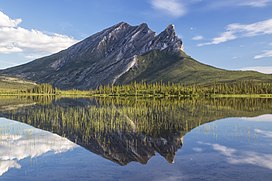| Sukakpak Mountain | |
|---|---|
 Sukakpak Mountain, north aspect Sukakpak Mountain, north aspect | |
| Highest point | |
| Elevation | 4,459 ft (1,359 m) |
| Prominence | 1,883 ft (574 m) |
| Parent peak | Dillon Mountain (4,820 ft) |
| Isolation | 3.3 mi (5.3 km) |
| Coordinates | 67°36′12″N 149°44′31″W / 67.6034460°N 149.7418296°W / 67.6034460; -149.7418296 |
| Geography | |
 | |
| Interactive map of Sukakpak Mountain | |
| Location | Yukon–Koyukuk Alaska, United States |
| Parent range | Philip Smith Mountains Brooks Range |
| Topo map | USGS Chandalar C-6 |
| Geology | |
| Rock age | Devonian |
| Rock type | limestone, marble |
| Climbing | |
| Easiest route | Scrambling south ridge |
Sukakpak Mountain is a prominent 4,459-foot (1,359 meter) mountain summit located in the Philip Smith Mountains of the Brooks Range, in the U.S. state of Alaska. The peak is situated 90 miles north of the Arctic Circle near milepost 203 on the Dalton Highway, and 200 mi (322 km) north-northwest of Fairbanks, where the Bettles and Dietrich Rivers merge to form Middle Fork Koyukuk River. The peak's Sukakpak name was reported in 1930 by the USGS as an Inupiat word, said to mean "marten deadfall." From the north, the mountain resembles a carefully balanced log used to trap marten. The name was officially adopted in 1932 by the U.S. Board on Geographic Names.
This famous landmark is notable for its west face, a massive wall of Skajit limestone rising nearly 3,000 feet (900 m) above the surrounding valley. Peculiar ice-cored mounds known as palsas punctuate the ground at the base of the mountain. Sukakpak Mountain was designated in 1990 as a BLM Area of Critical Environmental Concern to protect this extraordinary scenic and geologic formation.
Climate
Based on the Köppen climate classification, Sukakpak Mountain is located in a subarctic climate zone with long, cold, winters, and short, cool summers. Winter temperatures can drop below −30 °C (−22 °F) with wind chill factors below −50 °C (−58 °F). The months June through August offer the most favorable weather for viewing and climbing.
Gallery
-
 Sukakpak from northbound Dalton Highway
Sukakpak from northbound Dalton Highway
-
 Sukakpak's west face
Sukakpak's west face
-

-

-
 Palsa
Palsa
-

-
 Sukakpak Mountain and cottongrass
Sukakpak Mountain and cottongrass
-

-

-
 North aspect
North aspect
See also
References
- ^ "Sukakpak Mountain, Alaska". Peakbagger.com. Retrieved February 15, 2020.
- Sukakpak Mountain, listsofjohn.com
- ^ "Sukakpak Mountain". Geographic Names Information System. United States Geological Survey, United States Department of the Interior. Retrieved February 15, 2020.
- Peel, M. C.; Finlayson, B. L.; McMahon, T. A. (2007). "Updated world map of the Köppen−Geiger climate classification". Hydrol. Earth Syst. Sci. 11. ISSN 1027-5606.
External links
- Weather forecast: Sukakpak Mountain
- View from summit: Flickr photo
- Sukakpak pronunciation